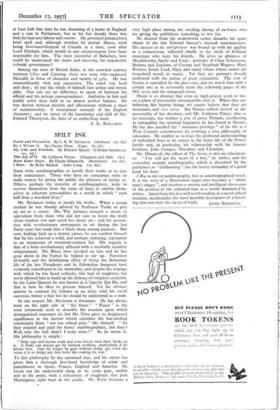SPILT INK
SOME write autobiographies to justify their works or to ease their consciences. Those who have no conscience write to make money by giving the public the pleasure of saying so.
Others, perhaps the majority of autobiographers, write to recover themselves from the ruins of time, to exhibit them- selves as coherent personalities in a world in which " each half lives a hundred lives."
Mr. Nevinson writes to justify his works. When a young student he was bluntly advised by Professor Tonics to give up art as a career. His War pictures aroused a storm of opposition from those who did not care to know the truth about modern war and cared Less about art ; and his associa-
tion with revolutionary movements in art during the last thirty years has made him a black sheep among painters. But now, looking back on a stormy career, he can comfort himself that he has achieved a solid, and perhaps enduring, reputation as an interpreter of twentieth-century life. His tragedy is that of a born revolutionary afflicted with a morbidly sensitive temperament. His Blasts have recoiled on him and he has gone down in the Vortex he helped to stir up. Persistent ill-health and the debilitating effect of living the Bohemian life of the late Decadence and its Edwardian hangover have evidently contributed to his morbidity, and despite the courage with which he has faced setbacks, this lack of toughness has never allowed him to build up the defence of complete cynicism. In the Latin Quarter he was known as L'Apache Qui Rit, and that is how he likes to present himself. Yet his obvious anxiety to contrast his failures as an artist with his social successes betray a fear lest he should be underrated as a man.
In one respect Mr. Nevinson is fortunate. He has always been on the right side of " the fence." " Fence " is the term commonly used to describe the erection upon which distinguished statesmen sit, but Mr. Prior gives its heightened significance as the barrier which separates the law-abiding community from " not too ethical guys " like himself. " So they printed and paid for bums' autobiographies, did they ?
Well, why the . hell didn't I write mine ? " So he wrote it. His philosophy is simple :
" Only saps and horses work and even horses turn their backs on it. A bloke can always get by without working, particularly if he knows how. And the longer he goes without doing any work the easier it is to dodge any that looks like coming his way."
To this philosophy he has remained true, and his career has given him a thorough first-hand knowledge of crime and punishment in Spain, France, England and America. He hands out his underworld slang as he socks guys, swiftly and to the point, with a refinement of toughness that puts Hemingway right back in the cradle. Mr. Prior deserves a very high place among the swelling throng of ex-bums who are giving the publishers something to live for.
No discord from the underworld racket disturbs the quiet charm of the late Edward Speyer's musical reminiscences. His success as an entrepreneur was bound up with his qiiality as a connoisseur, reflected chiefly in the circle of brilliant musicians who were his friends. He gives us glimpses of Mendelssohn, Spohr and Liszt ; portraits of Clara Schumann, Brahms and Joachim, of Cosima and Siegfried Wagner, Haris Richter, Jenny Lind, Elgar and many others whose names are household words in music. Yet they are portraits already mellowed with the patina of great reputation. The coat of fustian is sanctified by the glass case, and we watch him with 'a Certain awe as he reverently turns the yellowing pages of the MS. score and the autograph letter.
Music. is so abstract that even its high-priests seem to live on a plane of personality incompatible with it. When they are behaving like human beings we cannot believe that they are musicians, and vice versa. But Nature reflects herself in the personality of her devotees, and Mr. Littleton Powys, who is no musician, has written a sort of prose Prelude, recollecting in tranquillity the spiritual happiness he has found in Nature. He has also justified the " immense privilege " of his life as a West Country schoolmaster by evolving a wise philosophy of education. He enables us to trace his profound understanding of individual boys to its source in the home life of the Powys family and, in particular, his relationship with his famous brothers, John Cowper, Theodore and Llewelyn.
Mr. Dimmock, the editor of The Scout, is also an education- ist. " I've still got the heart of a boy," he writes, and his somewhat scrappy autobiography, which is described by the publishers as " exhilarating ", has the hearty normality of a good. book for boys.
I Rise is not an autobiography, but an autobiographical novel. It is the story of a Demararan negro who becomes a " white man's nigger ", and involves a serious and intelligent discussion of the position of the coloured man in a world dominated by whites. Apart from this it is well worth reading as a novel, which Contains, incidentally, the most horrible description of a lynch- ing that ever bore the stamp of truth. JAMES BRAMWELL.














































 Previous page
Previous page